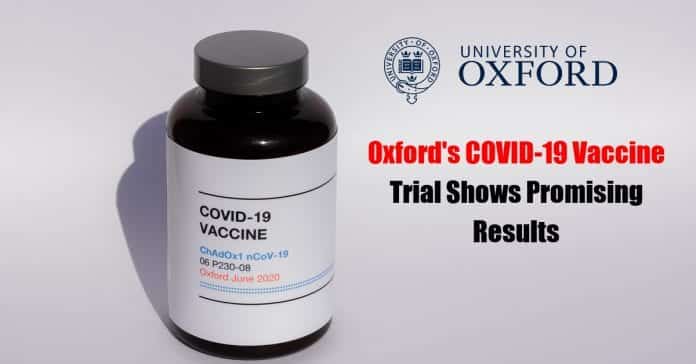UK COVID-19 Vaccine Trial Shows Promising Results
Oxford University Scientists say the hundreds of people who got the shots of their experimental coronavirus vaccine has shown a protective immune response in an early trial.
The testing of the vaccine was begun in April in about 1,000 people, where half of them received the experimental vaccine. The trial was done to evaluate the safety of the vaccine and to see what kind of immune response was provoked. However, the results can’t say if the vaccine really protects from COVID-19.
In people aged between 18 and 55, the COVID-19 vaccine provoked a dual immune response, which lasted for a minimum of two months since they were immunized, scientists reported in a paper published Monday in the journal Lancet.
Up to day 56 of the ongoing trial, the vaccine-induced T-cell and antibody immune responses in people who received the vaccine.
Dr. Adrian Hill, director of the Jenner Institute at Oxford University, said they are seeing a good immune response in almost everybody. What is best about this vaccine is ut triggers both arms of the immune system, he added. The vaccine-induced the production of neutralizing antibodies capable of blocking COVID-19 infection. The vaccine
also caused a reaction in T-cells, which would help to fight the novel coronavirus.After 14 days of immunization, a peak in the T-cell responses targeting SARS-CoV-2 spike protein was observed. The T-cell responses remained the same even after the second dose of vaccine, which is normal for vaccines of this kind.
Minor side effects like chills, muscle pain, and fever were observed more often in those who received an experimental vaccine than those who received a control meningitis vaccine. But taking paracetamol can control these side effects. No other serious adverse effects were observed.
A larger trial for assessing the efficacy of the vaccine is underway, involving 10,000 people in the UK, South Africa, and Brazil. The US will soon take part in the trial, enrolling 30,000 people.
How quickly scientists can determine the effectiveness of the vaccine will depend on how much is the transmission. But scientists hope they will have enough data by the end of this year to decide if the vaccine can be used in the mass population.
The level of antibodies produced by those who received the UK COVID-19 vaccine in the trial was comparable to those who recovered from COVID-19. The T-cell response would provide additional protection.
Scientists have shown that antibodies and T-cell responses are crucial in controlling COVID-19. The second dose of vaccine which was administered after four weeks might boost the immune response, Hill said.
Oxford scientists used an engineered harmless chimpanzee cold virus to carry the SARS-CoV-2 spike protein into the body to trigger an immune response, which would reduce disease and transmission.
To produce the vaccine globally, Oxford has collaborated with AstraZeneca, who has already committed to manufacturing 2 billion doses. But 2 billion doses won’t be enough as multiple doses of vaccine would be necessary to combat the virus.
According to Hill, controlling the pandemic is going to be very difficult without a vaccine, as the number of cases is surging globally.
Countries like the UK, Netherlands, Germany, France, Italy, and the US have already signed deals to receive a hundred million doses of the vaccine. The first delivery of the vaccine is expected by the fall. If the vaccine proves effective, Britan will be the first to get them.
On Monday, another experimental COVID-19 vaccine by Chinese researchers was published in the Lancet. They used a similar technique as Oxford scientists. The Chinese researchers reported that their vaccine generated an immune response in about 500 people. But they couldn’t tell if they were protected from the disease as they weren’t exposed to coronavirus afterward.
The vaccine developed by CanSino Biologics was similar to that of Oxford, but it was made with a human cold virus different from Oxford’s. The researchers noted that some people didn’t get much immune response specific to COVID-19 as their body recognized the human cold virus. But China’s military is already given the approval to use the vaccine while the final stage studies are going on.
Both the Chinese and Oxford results are “encouraging,” but further judgment should wait until the vaccine is tested on much bigger populations, said William Moss and Naor Bar-Zeev of the Johns Hopkins Bloomberg School of Public Health in an accompanying editorial. They said any effective COVID-19 vaccine should be equally distributed around the world.
They wrote, “Global planning is underway, but should be underpinned and informed by specific local realities.” Only then will we be able to yield the global remedy for which we all yearn.
American researchers had announced last week the COVID-19 vaccine developed by the National Institutes of Health and Moderna boosted the immune system of people just as they expected, and the vaccine will now enter the final trials. The vaccine succeeded in producing key molecules for blocking the infection at levels comparable to COVID-19 recovered people.
Currently, about two dozen COVID-19 vaccines are in various phases of the clinical trial, and a few of them have already entered the last phase of the testing, including the UK COVID-19 vaccine.
































